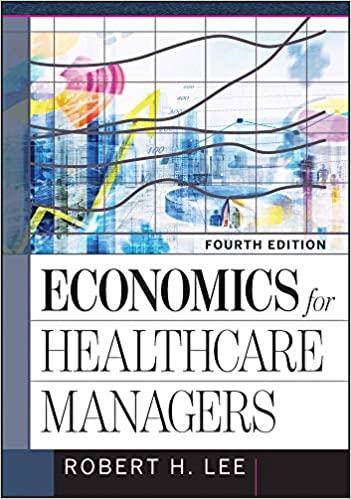Question
Rising prices for health-care services and insurance continued to drive up health spending in 2018, even as the amount of health care Americans used remained
Rising prices for health-care services and insurance continued to drive up health spending in 2018, even as the amount of health care Americans used remained steady. National health spending reached $3.6 trillion — about $11,172 per person — in 2018, a 4.6% increase from the previous year, according to an annual report by the Office of the Actuary at the Centers for Medicare and Medicaid Services, published online in Health Affairs. CMS researchers found that the rise in overall health spending was driven by an increase in the cost of health insurance, which researchers attributed in part to a tax on health insurers. The so-called health insurance tax, established under the Affordable Care Act, was suspended for 2017 but reinstated the following year. It applies to all insurers who sell major medical insurance, including private health insurance, Medicare Advantage plans, and Medicaid managed-care plans. Insurers pass on the fee to consumers in the form of higher premiums. Private Health insurance spending rose to $1.2 trillion in 2018, up 5.8% from the previous year, even as enrollment declined. The number of uninsured people rose by 1 million for the second consecutive year, to 30.7 million in 2018, according to the report. Spending on Medicare, which covers seniors and some disabled people, rose 6.4% in 2018, topping $750 billion, while enrollment remained steady. Traditional Medicare accounted for a larger share of overall Medicare spending, compared with Medicare Advantage plan spending, but rose at a slower rate. Private Medicare plans — primarily Medicare Advantage plans, which are run by insurance companies — saw spending rise 11.8% in 2018, compared with a 3.5% growth in spending by traditional Medicare, which is run by the government. Health-care prices also contributed to rising health spending. Hospital prices rose 2.4% in 2018, outpacing growth in use — total inpatient days rose just 0.7% that year. Spending on prescription drugs also accelerated in 2018. The study found that a decline in generic drug prices was more than offset by an increase in the number of prescriptions dispensed and an uptick in use of more expensive, brand-name medications. The report comes as enrollment deadlines near for individual health plans and Medicare. People covered by Medicare have until Dec. 7 to make any changes to their plan. The deadline to enroll in insurance through healthcare.gov is Dec. 15. Joshua Peck, a cofounder of Get Covered America, which helps people sign up for healthcare.gov plans, urged consumers to check out their options — even if they think insurance will be too expensive. Quality coverage is much, much more affordable than most people think,” Peck said. Pennsylvania residents who qualify for income-based tax credits may find healthcare.gov plans for as little as $10 a month."
Question (I have to write a whole page on this and I don't understand it so please be beefy): "Use your knowledge of elasticity to discuss the reason why healthcare and hospital usage did not decrease even though the price increased." It is important to incorporate the elasticity!
Step by Step Solution
There are 3 Steps involved in it
Step: 1
To address the question regarding the lack of decrease in healthcare and hospital usage despite price increases we need to delve into the concept of e...
Get Instant Access to Expert-Tailored Solutions
See step-by-step solutions with expert insights and AI powered tools for academic success
Step: 2

Step: 3

Ace Your Homework with AI
Get the answers you need in no time with our AI-driven, step-by-step assistance
Get Started


